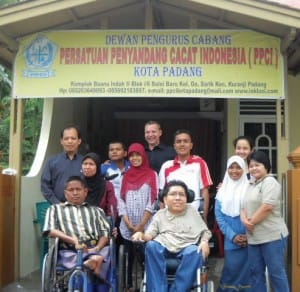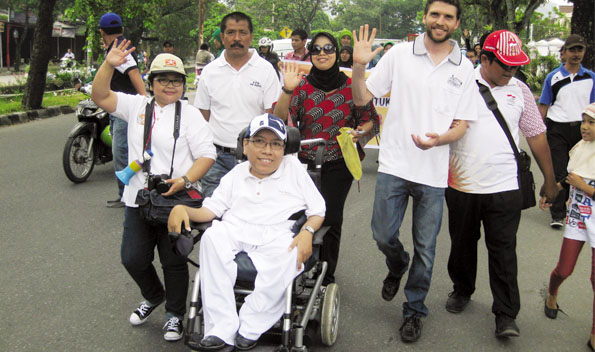During the last decade, Indonesia has experienced steady progress in an increase in per capita income and in poverty elimination. However, the country faces challenges in achieving equal growth. The poverty rate is still fairly high and inequality, especially for marginalized and vulnerable people, including people with disabilities, still happens. They are often socially isolated and face discrimination with access to health, education and jobs.
According to the Ministry of Social Affairs’ centre for data and information (Pusdatin), the number of persons with disabilities in Indonesia in 2010 reached 11,580,117 consisting of 3,474,035 with visual disabilities, 3,010,830 with physical disabilities, 2,547,626 with hearing disabilities, 1,389,614 with mental disabilities and 1,158,012 with chronic disabilities. The numbers are predicted to increase in times to come.
In response to injustice facing people with disabilities, Padang’s local chapter of the Indonesian Disabled People Association (PPDI) explores every avenue in its attempts to advocate for people with disabilities. One of its major efforts is to support implementation of the Convention on the Rights of Persons with Disabilities (CRPD) in West Sumatra and Padang.
Antoni Tsaputra, the organization’s founder, asserts that the efforts have three objectives; namely to encourage implementation of the CRPD in inclusive regional development in West Sumatra and Padang, to raise awareness of policy makers/government officials, community and people with disabilities in Padang on the rights of people with disabilities as stipulated in the CRPD, and to equip disabled people’s organisations (DPOs) in Padang city with knowledge and skills on advocacy of the CRPD and other legal rights.
To achieve these objectives, Padang’s local chapter of the Indonesian Disabled People Association has completed four project activities: holding a one-day seminar on the meaning of the ratified CRPD and how to implement them in inclusive regional development in West Sumatra; conducting a focus group discussion (FGD) on the CRPD and the need of a local law on disability discrimination with budget and legal drafting committees of local parliament of Padang city and local NGOs; creating 500 booklets of easy-to-read information of the CRPD in Indonesian and Minang languages; and conducting Training of Trainers (ToT) on the advocacy of the CRPD and other legal rights with the board of PPDI Padang and PPDI West Sumatra.
Having evaluated the activities undertaken, any changes have been visible and identifiable within the scopes of DPOs, community and local government. In the DPOs, most PWDs in Padang and West Sumatra were not aware of national and international legal instruments that protect their rights. Now they are aware of the CRPD and national legal framework that protects the rights of PWDs. The UNCRPD is the ‘buzzing word’ for them. For example, board members of PPDI Payakumbuh District held a hearing with the local parliament and distributed the CRPD books to the parliament members to advance disability rights.
At the community level, most people looked at PWDs as an object of charity and mostly addressed PWDs with demeaning terminology such as ‘cacat‘ (crippled/invalid). Now more people and local media in Padang have been using positive terminology to address PWDs such as ‘disabilitas’ instead. They can now see that persons with disabilities can manage and run various advocacy activities from seminars to training. It shows them that PWDs are capable of doing most things, as long as they are given a chance.
More radical changes take place at government level. In previous times, the local government of Padang only had charity models in their programs, such as distributing mobility aids, prosthetics and cash incentives. Later, some departments and offices of the local government have been aware of the importance of disability inclusion as mandated by the CRPD, seen in their efforts to involve and engage DPOs in their programs and activities. For example, Padang’s Ministry of Social Affairs and Labours conducted a new activity in collaboration with PPDI to collect skills and education-based data of persons with disabilities in 11 Subdistricts of Padang, the Ministry of Transportation consulted PPDI Padang to provide accessibility for new fleet of Mass Transit Buses to launch by year end, and the Ministry of Education invited representatives from PPDI Padang to be one of the members of working group for implementing inclusive education in Padang city.
During the course of grant implementation within the organization and the community, Antoni asserted, “The most important lesson we learned in our community is that they will realize our capacity when we showcase an activity. We need to always invite media for that purpose. There should be more media coverage for our advocacy work.”
He further reminded, “Solid teamwork and similar perception among different DPOs and other organizations involved in the project is the very key of the success of our work. Developing and maintaining close relationship with key figures in the government is also very important to facilitate our activities.”
In its continued efforts to mainstream disability rights, PPDI Padang gets a fresh blood with Australian Volunteers International (AVI) becoming its new partner. While joining the parade of the International Day for People with Disabilities last December 2013 in Padang, Eban Pollard, a volunteer of AVI said, “The atmosphere was inclusive and it really showed how much is already being done to improve the welfare and raise awareness of people with disabilities in Padang. While AVI volunteers have worked with DPOs in Cambodia, this is the first time that an Indonesian DPO will host an AVI Volunteer.”
Representing AVI, Eban gets involved in various activities designed and carried out by PPDI Padang. To develop his literacy to Indonesian language for people with disabilities, he actively attends training for Indonesian Sign Language (Bisindo) along with people with hearing disabilities in West Sumatra. The trainer is Mrs. Pinky, a motivational coach, one of the eight translators of Bisindo in the country and the most frequently appeared translator on TVRI. For the sake of capacity building, Eban and PPDI Padang organized English courses for communication and conversation for its members, which is free. The course is held every Saturday from 3-5pm at of PPDI Padang office on Jl. Paus 10 Ulak Karang Padang. The first meeting began on 25 January 2014.




